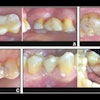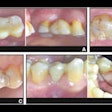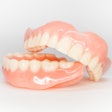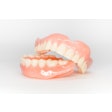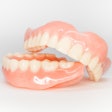
NEW YORK (Reuters Health), Sep 5 - Loading up on denture cream can be hazardous to your health, new research suggests.
In the medical journal Neurology, Dr. Sharon P. Nations of the University of Texas Southwestern Medical Center in Dallas and her colleagues report on four denture-wearing patients who developed neurological problems.
All had abnormally high levels of zinc in their blood, accompanied by abnormally low levels of copper. Because denture cream contains zinc, and all of the patients habitually used "extremely large amounts," Nations and her team propose that excess denture cream use led to their neurological problems.
Balance between zinc and copper in the body is essential for neurological health. Taking in too much of one of these trace metals can cause depletion of the other.
Normal blood levels of copper range from 0.75 to 1.45 micrograms per milliliter (mL), but levels for the patients in the report ranged from less than 0.1 to 0.23 micrograms per mL.
The top normal number for zinc blood levels is 1.10 micrograms per mL, but patients had levels ranging from 1.36 to 4.28 micrograms per mL.
One patient's symptoms included weakness in the hands and poor balance, while another had weakness in her arms and legs that made her wheelchair dependent, along with cognitive decline and urinary incontinence.
These patients showed "mild neurologic improvement" after they quit using denture cream and began taking copper supplements.
Another patient took copper supplements but didn't stop using denture cream. His copper levels improved, but his zinc levels remained too high and he showed no improvement in his neurological symptoms. The fourth patient, who took copper supplements and stopped using denture cream, showed improvement in copper and zinc levels, but no improvement in neurological symptoms.
Testing revealed zinc concentrations between 17,000 and 34,000 micrograms per gram in the denture creams the patients used. This is the only "plausible explanation" for their high zinc levels and copper deficiency, the researchers say.
Used as recommended, a tube of denture cream should last from three to 10 weeks, the researchers note, but patients in the report were all using at least two tubes a week. Three had also lost their teeth at a relatively young age, meaning they had been used "extremely large amounts of denture adhesive daily for years."
Based on patients' denture cream use, the researchers estimate that they were exposed to at least 330 mg of zinc daily, far more than the recommended daily allowance of 8 mg for women and 11 mg for men. The National Academy of Sciences stated in 2001 that the largest daily tolerable zinc intake is 40 mg.
Nations and her team urge people using large amounts of denture cream due to ill-fitting dentures to seek professional care.
Source: Neurology, August 26, 2008.
Last Updated: 2008-09-05 15:00:07 -0400 (Reuters Health)
Copyright © 2008 Reuters Limited. All rights reserved. Republication or redistribution of Reuters content, including by framing or similar means, is expressly prohibited without the prior written consent of Reuters. Reuters shall not be liable for any errors or delays in the content, or for any actions taken in reliance thereon. Reuters and the Reuters sphere logo are registered trademarks and trademarks of the Reuters group of companies around the world.


